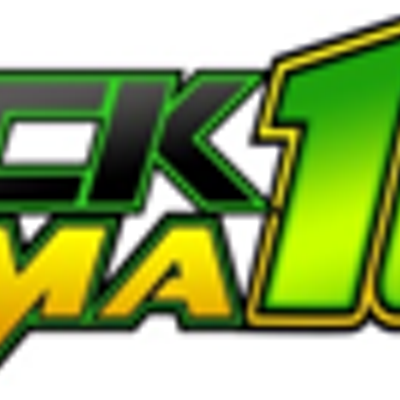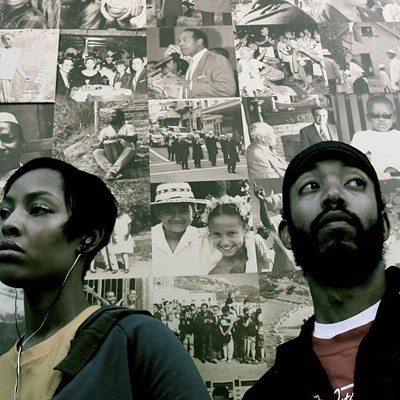"Well, that was too fast," Rabbi Samuel Cohon tells five musicians in the band when the song finishes. "But it definitely had that Tucson sound."
The Los Angeles-born Cohon is the band's leader and lead singer, a 42-year-old with reddish brown hair and beard who, for lack of a better word, is pretty cool. A snappy dresser who wears elegant suits with leather suspenders, Cohon drives a convertible Mustang and loves popular music as much as he does Jewish liturgy.
The rabbi turns his attention to drummer Howard Salmon, 40, who works during the day as an artist. "Is there a way to play any quieter?"
"I am already playing pretty quietly," Salmon responds. And compared to the secular rock bands with which Salmon has played over the years, he's probably restraining himself heroically.
But the sanctuary, normally reserved for Jewish religious services, is so acoustically "live," an amplified rock band tends to overwhelm the ears in the space.
In one of several interruptions in the rehearsal, a Temple worker enters to inform the Rabbi that nobody has shown up for a meeting of the congregation's adult education committee. The rabbi asks that the committee members be contacted again, emphasizing the importance of them meeting.
No, this ain't your typical rock band rehearsal, but some elements are familiar, such as when Avanim lurches into the opening of a song. "Hang on, guys," says the rabbi. "Let's all start at the same time, maybe?" When a sour note is struck, Cohon glances over, unable to suppress his wince.
And when electric guitarist and musical director Steve Schulman--by day, the 54-year-old Tucson music veteran teaches math, social studies and music at Doolen Middle School--embellishes a song's conclusion with a few bluesy licks, the rabbi admonishes him to end more cleanly.
But when Schulman holds back on the volume of his sustain of another note, Cohon says, "That actually can be a little louder."
In between tunes, band members play snatches of The Cars and Led Zeppelin, never able to stump the pop-music-savvy rabbi.
A performer since the age of 6, Cohon sings in English and Hebrew with a deep, resonant voice that is evidence of his classical training, early career as a cantor and years spent singing jazz and Broadway show tunes.
"I guess you would say that I am lyric baritone. But there isn't much of lyric anything in rock," he chuckles during an interview a few days later, only minutes before leading a weekly Shabbat service.
In fact, Shabbat is the subject of Avanim's debut CD, A Rock Shabbat, released earlier this year. It's a rock 'n' roll interpretation of the service that, well, kicks butt, quoting from The Beatles, James Brown, Pink Floyd, New Riders of the Purple Sage and other rock icons.
The two-year-old Avanim--the name means "rocks" in Hebrew, not the verb but a plural noun--also has in its repertoire rock versions of Jewish holiday services such as Purim, Passover and Hanukkah.
The group performs live at Shabbat once a month, usually the second or third Friday. The next performance is Sept. 12.
The rabbi is also hip to jazz.
"As a cantor, you learn how to improvise, which is the heart of jazz. Cantorial music is improvised to a substantial degree. Tempo is very loose. As a cantor, you don't have to stick to strict time so much." Which was a challenge for him and the band when it came to playing in a rock context, he says.
"It was a bit of a discipline to me recording a CD. I'd done rock, but not systematically or in a Jewish context. It's another whole thing to be doing Jewish music as rock."
Cohon's father, Baruch J. Cohon, also was a cantor and rabbi, so his calling to music and spirituality is a legacy. "It's sort of the family business," he says.
In the liner notes of A Rock Shabbat, Cohon is credited with being "lead singer with the band," which sounds like an in-joke allusion to something from This is Spinal Tap or Almost Famous. But its reference is elusive.
So the rabbi explains: "Steve (Schulman) and I were at a Friday night service once. Maybe it was a community reception, but it was something for which I was there in my rabbi role--I think I had to give the invocation. Anyway, he introduced me simply as 'the lead singer in my band,' and it has stuck."
As even the most casual observer might guess, the collective goal of Avanim includes neither fame, nor riches, nor appearing on the cover of Rolling Stone. But Cohon doesn't even mention spirituality as a raison d'etre of the band--maybe that's just taken for granted.
Fun seems to be a primary objective. "We just have a great time. For us, it is also a way of doing something musically different with Jewish music, a way of trying to make something new," Cohon says.
Avanim also includes keyboardist Sheryl Sitser, bassist Tommy Millstone and acoustic guitarist Joe Millstone.
Tommy Millstone, a 20-year-old political science junior at the University of Arizona, is the son of Joe, 52, a commercial real estate broker and retired teacher.
The elder Millstone has been friends with lead guitarist Schulman for decades. "Steve taught me how to play guitar 30 years ago," Joe Millstone says. "We really like each other in this band. I look forward to (rehearsals and gigs) more than anything."
Filling out Avanim's sound is 14-year-old vocalist Lindsey O'Shea, a Catalina Foothills High School freshman. Sometimes she harmonizes with the rabbi; sometimes they alternate vocals.
In rehearsal, the group decides its needs to polish "Hashkiveinu--Let There Be Love," a traditional Jewish evening prayer arranged by the rabbi's father.
Cohon intones the lyrics in Hebrew and O'Shea sings them in English. During Cohon's vocal, Schulman unfurls a striking flamenco-style solo on electric guitar, following which the band rumbles into a bruising and dramatic blues-rock progression that brings to mind the legendary blues-rock power trio Cream.
At one point, Cohon introduces to the band legendary session bassist Harvey Brooks, who has played with such luminaries as Miles Davis, Bob Dylan and The Doors' Ray Manzarek. Brooks has been quietly observing the proceedings. A member of the Temple Emanu-El congregation since retiring to Tucson four years ago, Brooks has agreed to offer the band some pointers.
He tells the Avanim members, "You're all playing the right things, but there is a É gap. You're having timing problems, and the reason you're having timing problems is that you can't hear (each other)." Brooks quickly directs the band members to re-arrange their positions on the altar-cum-stage.
And, wouldn't you know it, the sound is better after the switch--Avanim sounds tighter, more organic and dramatic.
Some might assume that the walls would come down in this holy place, assaulted as it is by this rock 'n' roll, but not so. This music, even without an audience, rocks convincingly and inspires enough of palpable reverence to give a listener a goose bump or two.










